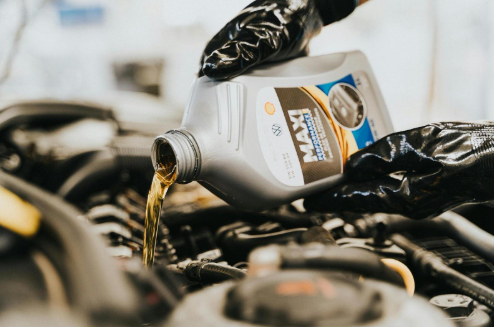Your GMC vehicle is built to be tough and dependable — just like you'd expect from this American brand. But even the toughest GMC needs proper upkeep to keep running at its best. Following the correct oil change and fluid maintenance schedule is an important step in keeping your truck, SUV, or crossover going strong for the long haul. Let's explore more about the GMC maintenance schedule and why following it is crucial for your GMC.
Understanding GMC's Oil Life Monitoring System
Modern GMCs come equipped with an oil life monitoring system that tracks data such as engine temperature, rpm patterns, and hours driven to determine when your vehicle actually needs an oil change. You can access your oil life monitor through the driver information center on your dashboard. It shows oil life as a percentage, with 100% meaning fresh oil. “Change Oil Soon” warnings usually appear around the 3,000-mile mark. However, this alert can be premature if you're using full synthetic rather than conventional oil.
General GMC Oil Change Schedule
Recommended oil change intervals depend on what oil you're using and how you drive. Conventional oil typically needs changing every 3,000 miles, but GMC says if you're using full synthetic oil, it can stretch to between 5,000 and 7,500 miles. This aligns with GMC's standard maintenance plan, which typically calls for service every 7,500 miles for most models.
In addition to oil, your GMC also relies on several other fluids to run properly, including transmission fluid, coolant, brake fluid, power steering fluid, and transfer case fluid (for four-wheel-drive models). Each fluid has its own replacement schedule based on your vehicle's setup and how you use it.
Oil Types and Specifications for GMC Vehicles
Using the correct fluids in your GMC preserves its performance and warranty. For new GMC engines, it's recommended that you use full synthetic oil meeting dexos1 Gen 3 specifications. Most V-8 engines use SAE 0W-20 oil, while four-cylinder engines use SAE 5W-30 oil.
Dexos1 Gen 3 oil is engineered to provide better sludge and air bubble resistance, increased protection against wear, and improved cold-weather performance. It also resists heat breakdown, helping to extend the life span of your engine and improve fuel efficiency.
General GMC Maintenance Schedule
Following GMC's standard maintenance schedule helps to keep your vehicle in optimal condition. Every 7,500 miles, GMC recommends changing the oil and filter, rotating the tires, checking the fluid levels, and inspecting the brakes, belts, hoses, and wiper blades. At 22,500 miles, it's time to inspect the brake pads and replace the cabin air filter, as well as replace the transfer case fluid in four-wheel-drive models.
When you reach 45,000 miles, it's time to replace the engine air filter and inspect the transmission fluid, brake and clutch fluid, and spark plugs. At 150,000 miles, the cooling system should be drained and refilled and the drive belt inspected.
How Driving Conditions Affect Your Service Schedule
Many GMC owners don't realize they drive under “severe” conditions. These include driving in extreme temperatures or stop-and-go traffic, travelling in mountainous or dusty regions, towing heavy loads, commercial use, and taking frequent short trips. Short trips can prevent your oil from reaching optimal temperatures, causing insufficient lubrication and moisture buildup, which can lead to oil breakdown and engine wear. Driving in dusty conditions may necessitate more frequent air filter replacements, while off-roading or driving on gravel roads can increase tire wear. If you regularly drive under these sorts of conditions, you should follow GMC's severe-use maintenance schedule.
Professional Auto Service vs. DIY
Getting professional GMC service offers several advantages. Trained technicians understand GMC vehicles and can provide expert advice based on your model, driving habits, and local conditions. They also have access to professional diagnostic tools and genuine GMC parts, which can preserve your warranty.
DIY maintenance can save you money, especially for simple tasks such as checking fluid levels, replacing air filters, and monitoring tire pressure. However, today's vehicles are complex, which can make DIY repairs riskier, so it's best to leave transmission work, coolant flushes, and diagnostics to professionals with the proper tools and expertise.
Keep Your GMC Running Strong With Professional Maintenance
Following GMC's oil change and fluid replacement schedule is one of the most important things you can do to protect your vehicle. Regular maintenance helps preserve the reliability, performance, and life span of your GMC for years to come. With proper care, GMC vehicles can easily travel 200,000 miles or more, giving years of solid service that makes the small cost of regular maintenance totally worth it.
If you're ready for your next service, give our Kirksville Motor Company service center a call. We'll keep your GMC running strong with maintenance tailored to your driving habits and local Missouri conditions.
Close up of Pouring Oil to Engine by Daniel Andraski is licensed with [Pexels License]



